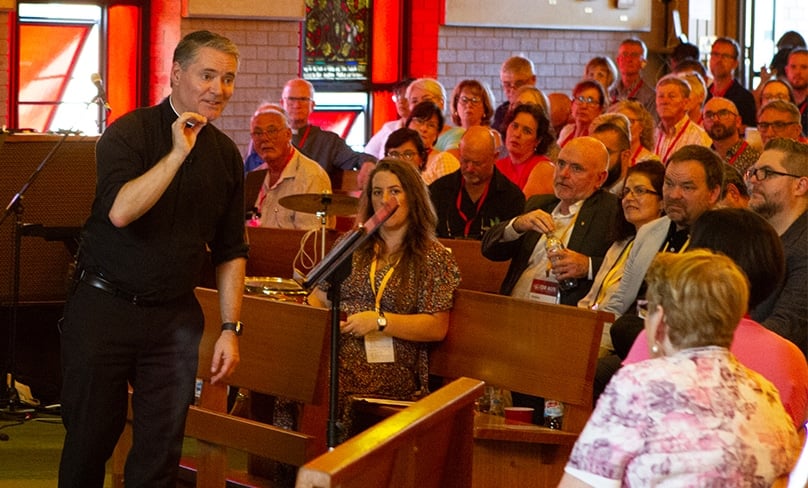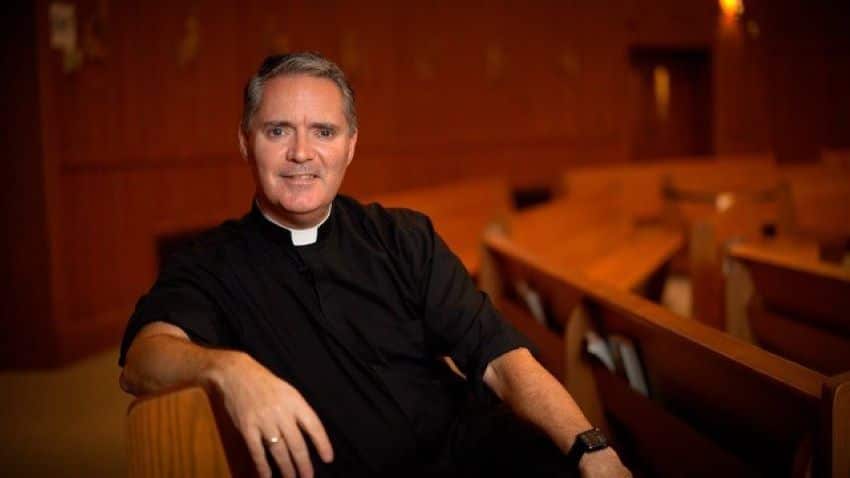
Divine Renovation author Fr James Mallon shares what he has learned from his adventures in parish renewal
Is parish renewal essential? Absolutely. Is it possible in a time when religious faith is facing serious challenges? Absolutely, again. Canadian priest Father James Mallon is adamant parishes can build themselves into centres of the new evangelisation.
The founder of the Divine Renovation Ministry and author of books including Divine Renovation: From A Maintenance To A Missional Parish, for parishes seeking to cultivate communities of discipleship and vibrant and dynamic faith communities visited Australia in February.
Through a partnership with the Sydney Centre for Evangelisation he visited Sydney this month to deliver keynote presentations at the first Divine Renovation Australasia conference, which saw 500 delegates gather from across the country and New Zealand for three days. The Catholic Weekly put some questions to Fr Mallon about what missionary discipleship means and why parish renewal is important. Following are edited highlights.
“We have to constantly ask ourselves ‘Am I a disciple?’ because we may have been a disciple in the past and at some point we’ve stopped learning and becoming more like Jesus.”
What does it mean to be a disciple of Jesus today?
For Catholics the word disciple literally means learner or student. The Greek word is μαθητής (mathētēs). It’s where we get the word mathematics from. In English we take the word from discipline, so it’s an intentional discipline process of learning to be like Jesus, learning to follow him.
Not simply learning about him [by] doing bible studies or other courses, although most disciples engage in learning about Jesus as well, but the primary meaning is learning to follow and be like Jesus and that’s a life-long process.
We have to constantly ask ourselves ‘Am I a disciple?’ because we may have been a disciple in the past and at some point we’ve stopped learning and becoming more like Jesus. To be a disciple has to be something that follows from an encounter with Jesus, and then falling in love with Jesus, which creates a capacity for real learning.
The other side of it is to be a missionary disciple, which is a term Pope Francis uses frequently. You can’t separate a disciple from mission.
Evangelisation then, while it is a very complex process that involves a lot of different stages, is ultimately best defined as the making of disciples.

What is a parish?
A parish is a particular expression of the reality of the church that is defined by a geographical area, and although society has changed since the parish system began to emerge in the fifth and sixth century, the concept is still solid.
It’s a community of the faithful gathered around a shepherd, which comes together to celebrate the Eucharist and has a responsibility for this geographic area in terms of mission.
Pope Francis said in Evangelii Gaudium that while the parish has undergone a lot of change, it retains great elasticity in how it can be lived out if we are creative enough.
Someone said that it’s not that the Church has a mission it’s that the mission has a Church.
This is what the Magisterium has been saying, that the Church exists for mission. Mission is not what we do, it’s essential to who we are.
When we say in the Creed we believe in “one holy, catholic and apostolic church”, by apostolic we rightfully mean that we’re founded on the Apostles and their successors and we believe in the magisterium, but the term apostolic simply means missionary, it means sent.
“But how are we going to evaluate whether we are faithful to our mission if we don’t have any idea that we even have … a sense of purpose?”
How do we know if our parish needs renewing?
Check your pulse, if you don’t have one, your parish needs renewing. If you do have one, your parish needs renewing!
There is an expression from the Middle Ages, Ecclesia semper reformanda, the Church is always reforming. It’s human nature that we can drift from our key focus, we need seasons in which we rediscover our core mission, that’s why we have liturgical seasons.
But how are we going to evaluate whether we are faithful to our mission if we don’t have any idea that we even have a mission or have a sense of purpose?
If you ask the average Catholic coming out of Mass what they think the parish exists for, most will speak of a needs-based understanding; to meet my spiritual needs, where I come to be fed, where I bring my children to receive the sacraments.
I’d say that’s part of what a parish is about but misses the mark in terms of what God is actually calling parishes to be.

What does a renewed parish look like?
I think it is one where there is a clear sense of purpose and a critical mass of parishioners who are bought into and are excited about it. It doesn’t necessarily mean a busy parish.
It lives out in a very exciting way the mission of evangelisation, of making disciples and baptising and teaching. It’s not a group of Catholic laity being passively ministered to by a few professionals, but one that has been mobilised into an army of missionary disciples, who are beginning to put into practice what the Church teaches and have a very strong sense of co-responsibility so they feel as responsible for the mission of the Church as the clergy are.
It is where first and foremost the liturgy is celebrated in a beautiful and dynamic way, and where people encounter Jesus in a life-changing way.
It has a strong sense of its missional identity where people from all walks of life, all backgrounds, all kinds of messiness who don’t know the Lord are constantly being welcomed in and invited on a journey with us of spiritual transformation.
There people can experience real and authentic Christian community where people actually know each other and love each other, where people are affirmed in their giftedness and where their gifts are called forth and put towards fulfilling the mission of the Church.
“.. when we explain why we are going to do things differently now, that we don’t come across as condemning what was done before us.”
What are some of the challenges we may face?
I think the introduction of different ways to do things, or even having an influx of new people come into a parish can be very threatening for people who’ve been there for a long time. I’ve been in parishes where they’ve used a tool like Alpha to welcome new people who then are finding a home in the church and actually serving in ministry and this growing community is referred to as “those Alpha people”.
That reveals a kind of dysfunction Pope Francis talks about as self-referentiality; a church that is in itself, of itself, and for itself.
How do you work through resistance?
It’s painful and very difficult. Parish renewal happens through addition and attrition.
Changing a culture comes in many ways when there’s a critical mass of people who are very supportive, or highly enthused about where the parish is going. But some people will simply leave and go to another parish.
That’s why it’s so important when we explain why we are going to do things differently now, that we don’t come across as condemning what was done before us and the people who have done things before us.
We want to make clear that the reason we have to do things differently is because the world has changed. And it’s not that we have issues per se, about how things were done in the past.
The issue is that if the things we did in the 50s and 60s clearly don’t work to support our parish in our mission today, why are we still doing them?
For support in parish renewal in Sydney, go to www.gomakedisciples.org.au
Related Articles:
